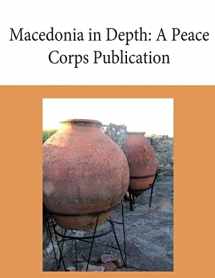
Macedonia in Depth: A Peace Corps Publication
Book details
Summary
Description
The Republic of Macedonia is a small, landlocked country in the Balkan Peninsula, bordered on the north by the newly independent Kosovo and Serbia, on the east by Bulgaria, on the south by Greece, and on the west by Albania. It forms part of the historical region of greater Macedonia, the rest of which is now in Greece and Bulgaria. The capital is Skopje. Formerly part of Yugoslavia, it became independent in 1991 and was admitted to the United Nations as the Former Yugoslav Republic of Macedonia under pressure from Greece, which objected to the use of what it considers a Hellenic name. (The ancient kingdom of Macedonia, situated in the north of modern Greece, was established by Perdiccas I in about 640 B.C.) Although a small country today, Macedonia was once the dominant power in the Balkans. In the Middle Ages it competed with the Byzantine Empire and greatly influenced the cultural life of the region until it was conquered by the Ottoman Turks in the late 14th century. In 1913, Macedonia was annexed by Serbia and, in 1918, it became part of the Kingdom of Serbs, Croats, and Slovenes (later known as Yugoslavia). From 1944–90, the country was part of the Socialist Federal Republic of Yugoslavia. In 1990, a coalition of reformist communists and Macedonian nationalists took office and, in 1991, Macedonia, following the example of Croatia and Slovenia, declared its independence from Yugoslavia and adopted a new Constitution. Greece, which controlled the southern part of historical Macedonia and feared claims on its territory by Macedonian nationalists, opposed recognizing the new nation under the name “Macedonia” and imposed an economic blockade. Macedonia gradually won recognition from most of the international community, however, and was admitted to the United Nations (U.N.). The Republic of Macedonia is the constitutional name of the country (recognized by the United States and others) and Former Yugoslav Republic of Macedonia (FYROM) is the internationally recognized name by the United Nations. The name FYROM is not popular with Macedonians and should not be used within the country. In Greece, FYROM is the only name they will recognize. In 1993, Kiro Gligorov of the Social Democratic Alliance (former Communist Party) was elected as the first president of Macedonia. Over the next several years, the young democracy made slow progress in developing a stable government. In early 2001, internal tensions resulted in an armed insurgency led by radical elements of the ethnic Albanian minority. After six months of armed conflict, with negotiations conducted in parallel, the Ohrid Framework Agreement (OFA) was signed on August 13, 2001. The provisions of the OFA included the reaffirmation of the multi-ethnic identity of the country; equitable representation; the use of language, flags,and symbols; and decentralization and municipal reforms. As a result of the ongoing implementation of the OFA, interethnic relations became more relaxed, with isolated incidents of minor intensity and influence on the stability of the country. As of the date of this welcome book, nearly all elements of the OFA have been successfully implemented with a few items still under discussion, primarily regarding compensation for ex-combatants. With the declaration of independence in Kosovo in 2008, the official establishment of diplomatic relationships in 2009, and the finalization of the border demarcation with Macedonia the same year, all are having a significant contribution to regional stability. Decentralization reforms, especially the Law on Territorial Division that reduced the number of municipalities from 124 to 84, were passed in 2005. These reforms decentralized authority to local government for education, health care, infrastructure, and other services. Financing these local-level responsibilities is critical to the success of this reform.


We would LOVE it if you could help us and other readers by reviewing the book
Book review



